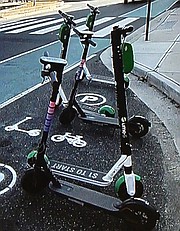Fairfax City has extended its pilot program for e-scooters in the City through the end of this year. And it made that decision in great part because of the adverse effect the pandemic has had on it.
On May 14, 2019, City Council authorized a one-year, pilot program permitting dockless, shared-mobility devices (more commonly known as e-scooters) to operate in Fairfax. Under the program, three companies – Bird, Lime and Spin –were allowed to rent e-scooters here, subject to the City’s terms and conditions.
But because of COVID-19, all three companies suspended operations in Fairfax last spring. So in May 2020, the pilot program was extended for six months. It was then slated to end on Dec. 31, 2020, unless the City took action – which it did at a recent Council meeting.
It was important for Fairfax to do so because – if it didn’t renew the program or replace it with a regulating ordinance – under the Code of Virginia, these e-scooter companies would be permitted to operate without City permits. In the summer, two of the companies – Bird and Lime – relaunched with updated sanitation practices, even though their operations in the City had to be scaled back.
Chloe Ritter, the City’s Multimodal Transportation Planner, explained that the pandemic affected and changed people’s activity patterns. For example, she said it resulted in more e-scooter usage on the GMU campus than in the City.
Therefore, Ritter told the Council, “We’re recommending the pilot program be extended for a year, because we haven’t had a chance to adequately evaluate its operation. And we don’t yet know what will happen in the long term.”
Agreeing, Councilmember Tom Ross said, “We haven’t really had the proper circumstances to see if this would work well. What are the takeaways you’ve learned?”
“This is an opportunity for connections,” replied Ritter. “And people are using e-scooters instead of transit – and for transit’s first and last miles – plus for shorter trips, like from GMU to Old Town.”
Councilmember Joe Harmon asked, “Is GMU using the same companies the City is?” Ritter answered yes. Harmon also wanted to know how many scooter trips there have been since the pilot program began.
“We’ve never reached the 250-scooter cap [per company] in the City,” said Ritter. “At its height, we had about 150-200 scooters/day for all three companies. And most recently, it’s been about 100-150 scooters/day – and with just two companies. There are probably about 350-400 scooters/day between the City and GMU.”
Harmon also asked, “Did we bring in about $15,000, last year, in permit fees from the three companies?” Ritter replied that the City had to pro-rate the figure, but said yes, it did.
“If we extend it for a year, will it still be considered a pilot program?” asked Councilmember Janice Miller.
“Yes, as we continue to evaluate it and what are the best options,” answered Ritter. “And I believe we can impose regulations at any time.”
Staff is also coordinating with GMU, whose staff is administering a similar program, to provide consistent regulations and to encourage scooter travel between the campus and the City. The latest extension of Fairfax City’s e-scooter pilot program was approved to run through Dec. 31 of this year.
